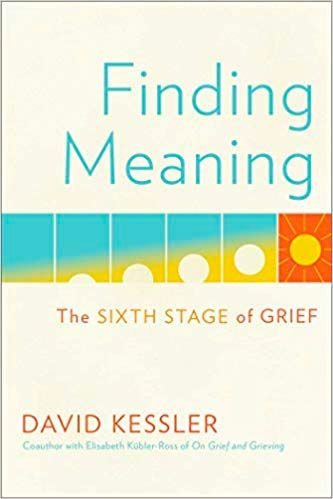According to Kãƒâ¼bler-ross, What Is the First Step People Pass Through as They Move Toward Death?

A Bulletin from David Kessler
I was privileged to co-author ii books with the legendary, Elisabeth Kübler-Ross, as well as adapt her well-respected stages of dying for those in grief. As expected, the stages would present themselves differently in grief. In our book, On Grief and Grieving we present the adapted stages in the much needed expanse of grief. The stages have evolved since their introduction and have been very misunderstood over the past four decades. They were never meant to help tuck messy emotions into neat packages. They are responses to loss that many people have, but there is not a typical response to loss as there is no typical loss.
The v stages, denial, anger, bargaining, depression and acceptance are a part of the framework that makes up our learning to live with the one we lost. They are tools to help us frame and identify what we may be feeling. Just they are not stops on some linear timeline in grief. Not anybody goes through all of them or in a prescribed order. Our promise is that with these stages comes the noesis of grief 's terrain, making us amend equipped to cope with life and loss. At times, people in grief will frequently report more stages. Merely remember your grief is an unique equally you are.

NEW Volume
Finding Meaning: The Sixth Stage of Grief
In this groundbreaking new work, David Kessler—an expert on grief and the coauthor with Elisabeth Kübler-Ross of the iconic On Grief and Grieving—journeys across the classic five stages to discover a sixth stage: meaning.
In this volume, Kessler gives readers a roadmap to remembering those who accept died with more beloved than pain; he shows united states how to move forward in a style that honors our loved ones. Kessler'south insight is both professional and intensely personal. His journey with grief began when, equally a kid, he witnessed a mass shooting at the aforementioned time his female parent was dying. For well-nigh of his life, Kessler taught physicians, nurses, counselors, police, and first responders about end of life, trauma, and grief, equally well as leading talks and retreats for those experiencing grief. Despite his noesis, his life was upended by the sudden death of his 20-one-twelvemonth-old son.
How does the grief expert handle such a tragic loss? He knew he had to find a way through this unexpected, devastating loss, a way that would honor his son. That, ultimately, was the sixth state of grief—meaning. In Finding Meaning, Kessler shares the insights, collective wisdom, and powerful tools that volition assist those experiencing loss. Read More
The Five Stages of Grief™️
 Deprival Denial is the first of the five stages of grief™️. Information technology helps us to survive the loss. In this phase, the globe becomes meaningless and overwhelming. Life makes no sense. Nosotros are in a state of daze and denial. We go numb. Nosotros wonder how we can continue, if we tin keep, why we should go on. We try to find a mode to merely go through each twenty-four hours. Deprival and shock help us to cope and make survival possible. Denial helps us to step our feelings of grief. There is a grace in denial. Information technology is nature's manner of letting in only as much as nosotros tin handle. As you take the reality of the loss and offset to enquire yourself questions, you are unknowingly start the healing process. You are becoming stronger, and the denial is beginning to fade. But as you lot proceed, all the feelings you were denying brainstorm to surface.
Deprival Denial is the first of the five stages of grief™️. Information technology helps us to survive the loss. In this phase, the globe becomes meaningless and overwhelming. Life makes no sense. Nosotros are in a state of daze and denial. We go numb. Nosotros wonder how we can continue, if we tin keep, why we should go on. We try to find a mode to merely go through each twenty-four hours. Deprival and shock help us to cope and make survival possible. Denial helps us to step our feelings of grief. There is a grace in denial. Information technology is nature's manner of letting in only as much as nosotros tin handle. As you take the reality of the loss and offset to enquire yourself questions, you are unknowingly start the healing process. You are becoming stronger, and the denial is beginning to fade. But as you lot proceed, all the feelings you were denying brainstorm to surface.
 Acrimony Acrimony is a necessary stage of the healing process. Exist willing to experience your anger, even though it may seem countless. The more than y'all truly feel it, the more information technology will begin to dissipate and the more than you will heal. At that place are many other emotions under the anger and you will become to them in time, but anger is the emotion we are most used to managing. The truth is that acrimony has no limits. It tin extend not only to your friends, the doctors, your family, yourself and your loved one who died, only also to God. You may ask, "Where is God in this? Underneath acrimony is pain, your pain. It is natural to feel deserted and abandoned, but nosotros live in a social club that fears anger. Anger is strength and it can be an ballast, giving temporary construction to the pettiness of loss. At first grief feels like being lost at bounding main: no connection to annihilation. Then yous get angry at someone, maybe a person who didn't attend the funeral, maybe a person who isn't around, maybe a person who is unlike at present that your loved one has died. Suddenly you lot have a structure – – your anger toward them. The anger becomes a bridge over the open up ocean, a connection from you to them. It is something to hold onto; and a connection made from the strength of acrimony feels better than nothing.We unremarkably know more about suppressing anger than feeling information technology. The anger is only some other indication of the intensity of your love.
Acrimony Acrimony is a necessary stage of the healing process. Exist willing to experience your anger, even though it may seem countless. The more than y'all truly feel it, the more information technology will begin to dissipate and the more than you will heal. At that place are many other emotions under the anger and you will become to them in time, but anger is the emotion we are most used to managing. The truth is that acrimony has no limits. It tin extend not only to your friends, the doctors, your family, yourself and your loved one who died, only also to God. You may ask, "Where is God in this? Underneath acrimony is pain, your pain. It is natural to feel deserted and abandoned, but nosotros live in a social club that fears anger. Anger is strength and it can be an ballast, giving temporary construction to the pettiness of loss. At first grief feels like being lost at bounding main: no connection to annihilation. Then yous get angry at someone, maybe a person who didn't attend the funeral, maybe a person who isn't around, maybe a person who is unlike at present that your loved one has died. Suddenly you lot have a structure – – your anger toward them. The anger becomes a bridge over the open up ocean, a connection from you to them. It is something to hold onto; and a connection made from the strength of acrimony feels better than nothing.We unremarkably know more about suppressing anger than feeling information technology. The anger is only some other indication of the intensity of your love.
 BARGAINING Earlier a loss, it seems like you lot will exercise anything if only your loved one would be spared. "Please God, " you lot bargain, "I volition never be aroused at my wife again if y'all'll just allow her live." Subsequently a loss, bargaining may take the form of a temporary truce. "What if I devote the remainder of my life to helping others. Then can I wake up and realize this has all been a bad dream?" We get lost in a maze of "If only…" or "What if…" statements. Nosotros want life returned to what is was; we want our loved one restored. We want to go back in time: detect the tumor sooner, recognize the illness more quickly, terminate the accident from happening…if simply, if only, if just. Guilt is often bargaining'southward companion. The "if onlys" cause us to find fault in ourselves and what we "call up" we could accept washed differently. We may even bargain with the pain. Nosotros will exercise anything non to feel the pain of this loss. Nosotros remain in the past, trying to negotiate our way out of the hurt. People often think of the stages as lasting weeks or months. They forget that the stages are responses to feelings that can terminal for minutes or hours equally we flip in and out of i and then another. We practise not enter and leave each individual stage in a linear way. We may experience i, then some other and back over again to the starting time one.
BARGAINING Earlier a loss, it seems like you lot will exercise anything if only your loved one would be spared. "Please God, " you lot bargain, "I volition never be aroused at my wife again if y'all'll just allow her live." Subsequently a loss, bargaining may take the form of a temporary truce. "What if I devote the remainder of my life to helping others. Then can I wake up and realize this has all been a bad dream?" We get lost in a maze of "If only…" or "What if…" statements. Nosotros want life returned to what is was; we want our loved one restored. We want to go back in time: detect the tumor sooner, recognize the illness more quickly, terminate the accident from happening…if simply, if only, if just. Guilt is often bargaining'southward companion. The "if onlys" cause us to find fault in ourselves and what we "call up" we could accept washed differently. We may even bargain with the pain. Nosotros will exercise anything non to feel the pain of this loss. Nosotros remain in the past, trying to negotiate our way out of the hurt. People often think of the stages as lasting weeks or months. They forget that the stages are responses to feelings that can terminal for minutes or hours equally we flip in and out of i and then another. We practise not enter and leave each individual stage in a linear way. We may experience i, then some other and back over again to the starting time one.
 Depression After bargaining, our attention moves squarely into the present. Empty feelings present themselves, and grief enters our lives on a deeper level, deeper than we ever imagined. This depressive stage feels as though information technology will last forever. It's of import to sympathise that this depression is non a sign of mental illness. It is the appropriate response to a slap-up loss. We withdraw from life, left in a fog of intense sadness, wondering, maybe, if there is whatsoever signal in going on alone? Why go on at all? Depression afterward a loss is also ofttimes seen as unnatural: a country to exist stock-still, something to snap out of. The first question to inquire yourself is whether or not the state of affairs yous're in is really depressing. The loss of a loved one is a very depressing situation, and depression is a normal and advisable response. To not experience depression after a loved i dies would be unusual. When a loss fully settles in your soul, the realization that your loved 1 didn't get better this fourth dimension and is not coming back is understandably depressing. If grief is a procedure of healing, so depression is ane of the many necessary steps forth the way.
Depression After bargaining, our attention moves squarely into the present. Empty feelings present themselves, and grief enters our lives on a deeper level, deeper than we ever imagined. This depressive stage feels as though information technology will last forever. It's of import to sympathise that this depression is non a sign of mental illness. It is the appropriate response to a slap-up loss. We withdraw from life, left in a fog of intense sadness, wondering, maybe, if there is whatsoever signal in going on alone? Why go on at all? Depression afterward a loss is also ofttimes seen as unnatural: a country to exist stock-still, something to snap out of. The first question to inquire yourself is whether or not the state of affairs yous're in is really depressing. The loss of a loved one is a very depressing situation, and depression is a normal and advisable response. To not experience depression after a loved i dies would be unusual. When a loss fully settles in your soul, the realization that your loved 1 didn't get better this fourth dimension and is not coming back is understandably depressing. If grief is a procedure of healing, so depression is ane of the many necessary steps forth the way.
 Acceptance Acceptance is often confused with the notion of existence "all right" or "OK" with what has happened. This is non the example. Nigh people don't e'er feel OK or all right about the loss of a loved one. This stage is well-nigh accepting the reality that our loved ane is physically gone and recognizing that this new reality is the permanent reality. We volition never similar this reality or make it OK, but eventually nosotros accept it. We learn to live with information technology. It is the new norm with which nosotros must learn to live. We must try to live now in a world where our loved one is missing. In resisting this new norm, at first many people want to maintain life equally it was before a loved one died. In time, through bits and pieces of credence, however, we run across that we cannot maintain the past intact. It has been forever changed and nosotros must readjust. We must larn to reorganize roles, re-assign them to others or take them on ourselves. Finding acceptance may be but having more practiced days than bad ones. As nosotros begin to live over again and relish our life, we often feel that in doing so, nosotros are betraying our loved i. We can never replace what has been lost, but we can make new connections, new meaningful relationships, new inter-dependencies. Instead of denying our feelings, we listen to our needs; we move, we modify, we grow, we evolve. Nosotros may start to accomplish out to others and become involved in their lives. Nosotros invest in our friendships and in our human relationship with ourselves. We begin to live again, merely we cannot practise so until nosotros have given grief its time.
Acceptance Acceptance is often confused with the notion of existence "all right" or "OK" with what has happened. This is non the example. Nigh people don't e'er feel OK or all right about the loss of a loved one. This stage is well-nigh accepting the reality that our loved ane is physically gone and recognizing that this new reality is the permanent reality. We volition never similar this reality or make it OK, but eventually nosotros accept it. We learn to live with information technology. It is the new norm with which nosotros must learn to live. We must try to live now in a world where our loved one is missing. In resisting this new norm, at first many people want to maintain life equally it was before a loved one died. In time, through bits and pieces of credence, however, we run across that we cannot maintain the past intact. It has been forever changed and nosotros must readjust. We must larn to reorganize roles, re-assign them to others or take them on ourselves. Finding acceptance may be but having more practiced days than bad ones. As nosotros begin to live over again and relish our life, we often feel that in doing so, nosotros are betraying our loved i. We can never replace what has been lost, but we can make new connections, new meaningful relationships, new inter-dependencies. Instead of denying our feelings, we listen to our needs; we move, we modify, we grow, we evolve. Nosotros may start to accomplish out to others and become involved in their lives. Nosotros invest in our friendships and in our human relationship with ourselves. We begin to live again, merely we cannot practise so until nosotros have given grief its time.
Larn More Nigh The Five Areas of Grief

Watch The FREE Video At present Click Here
Books About the Five Stages past Elisabeth Kübler-Ross and David Kessler



Source: https://grief.com/the-five-stages-of-grief/
0 Response to "According to Kãƒâ¼bler-ross, What Is the First Step People Pass Through as They Move Toward Death?"
Post a Comment